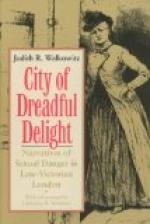“I saw Him come to Jerusalem. Multitudes followed Him and accompanied Him, casting their mantles and palm-branches in the way that His mule might tread upon them.”
The old man pointed south toward the single summit from which Christ approaching could overlook Jerusalem.
“On that hill,” he said, “while the multitudes hailed Him and the sound of Alleluia shook the air, He reined in His meek beast and looked upon this city, and wept over it. When He spoke, He said, If thou hadst known, even thou, at least in this thy day, the things which belong unto thy peace! but now they are hid from thine eyes. For the days shall come upon thee, that thine enemies shall cast a trench about thee, and compass thee round, and keep thee in on every side, and shall lay thee even with the ground, and thy children within thee; and they shall not leave in thee one stone upon another; because thou knewest not the time of thy visitation.
[Illustration: “And there His enemies crucified Him.”]
“And three days later, I saw the Rock of David and all that multitude follow Him unto the Hill of the Skull and there His enemies crucified Him!”
After a paralyzed silence, Laodice whispered with frozen lips,
“In God’s name, why?”
But he wisely did not pause with the calamity. He had the whole of the beginnings of Christianity to tell, a long narrative that contained as yet no dogma. Paul had seen the great light on the road to Damascus, and accepting apostleship to all the world had fought a good fight and had come unto his crown of righteousness; Peter had established the Church and had fed the sheep and had been offered up by the Beast who was Nero; John the Divine was seeing visions of the Apocalypse in the Island of Patmos; Herod Antipas, “that fox,” had passed to his own place, prisoner and exile, sacrifice to a mad Caesar’s imaginings; Judas had hanged himself; Pilate had drowned himself; thousands of the saints had died for the faith by fire and sword and wild beasts; kings had been converted and of the believers in Rome it was said, Your faith is spoken of throughout the whole world.
Laodice sat with clasped hands, intent on each word as it fell from the lips of the aged teacher, seeing at one and the same time the Kingdom of Heaven constructed and her dream of an earthly empire falling.
“He said,” the Christian continued, “They that are whole need not a physician; but they that are sick. I came not to call the righteous, but sinners to repentance.”
Repentance was a rite for Laodice, a payment of offering, a process to the righteously inclined, a thing that could in no wise purify the sinner as to make him worthy of association with the upright. The old Christian’s use of the word was different; he had said that the Messiah came to the sinner, and not to the righteous. Had the young Jewess been less in need of comfort in her own consciousness of spiritual delinquency she would have set down the old teacher as one of the idlest dealers in contradiction. But now she listened with keener zest; perchance in this doctrine there was balm for her hurt. She made some answer which showed the awakening of this new interest and then with infinite poetry and earnestness he began to unfold the teachings of Christ.




